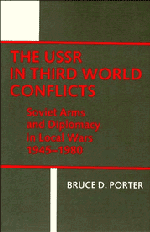Book contents
- Frontmatter
- Contents
- Preface
- 1 Introduction
- 2 The USSR in local conflicts: a historical overview
- 3 Soviet power projection: advances in postwar military capabilities
- 4 The case studies: a framework for analysis
- 5 The Yemeni civil war
- 6 The Nigerian civil war
- 7 The Yom Kippur war
- 8 The Angolan civil war
- 9 The Ogaden war
- 10 Conclusions
- Index
- Frontmatter
- Contents
- Preface
- 1 Introduction
- 2 The USSR in local conflicts: a historical overview
- 3 Soviet power projection: advances in postwar military capabilities
- 4 The case studies: a framework for analysis
- 5 The Yemeni civil war
- 6 The Nigerian civil war
- 7 The Yom Kippur war
- 8 The Angolan civil war
- 9 The Ogaden war
- 10 Conclusions
- Index
Summary
The principal foundations which all states have are good laws and powerful armies. Since there can be no good laws where there are not strong armies, I shall set aside any discussion of laws and proceed to speak of armies.
Niccolo Macchiavelli,The PrinceAs the 1970s progressed, the problem of Soviet military involvement in Third World conflicts came to assume an increasingly prominent place on the U.S. foreign policy agenda. The USSR attempted – by means of diplomacy, military advisers, arms shipments, and occasionally troops – to influence the course of at least eight localized conflicts during the decade. The list of those conflicts reads like a roll call of the decade's most dangerous international crises and hot spots: the Indo-Pakistani war, the Yom Kippur war, the war in Vietnam, the Angolan civil war, the Ogaden war, the intra-Communist clash in Indochina (Vietnam's invasion of Cambodia and China's incursion into Vietnam), South Yemen's brief clash with Yemen, and the civil war in Afghanistan. The USSR had been involved militarily in local conflicts before, of course, but the magnitude, scope, and apparent success of its efforts in the 1970s were perhaps without precedent.
In the 1950s and 1960s the Soviet Union's involvement in local conflicts, though often receiving considerable publicity, generally took place on a modest scale with respect to the actual volume of military equipment delivered to Third World clients at war. The main exceptions to this pattern were the massive Soviet arms shipments to the regimes in Pyongyang and Hanoi during the Korean war and the war in Vietnam.
Information
- Type
- Chapter
- Information
- The USSR in Third World ConflictsSoviet Arms and Diplomacy in Local Wars 1945–1980, pp. 1 - 4Publisher: Cambridge University PressPrint publication year: 1984
